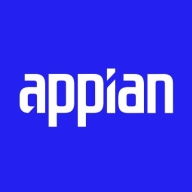

Appian and GitHub CoPilot are competitors in the realm of enterprise application development and coding assistance tools, respectively. Appian seems to have the upper hand in enterprise environments due to its comprehensive feature set and process management capabilities, while GitHub CoPilot excels in enhancing individual developers' efficiency with AI-driven coding support.
Features: Appian is notable for its robust low-code platform, offering rapid development and seamless integration capabilities. It supports comprehensive process management and is user-friendly for less technical users. GitHub CoPilot provides AI-driven code suggestions, integrates with leading IDEs, and enhances development efficiency with its coding assistance, making it particularly valuable for individual developers.
Room for Improvement: Appian needs improvements in flexibility, UI customization, and mobile/offline capabilities. For GitHub CoPilot, integration with more IDEs and better accuracy in complex scenarios are needed. Improving code suggestion quality and introducing report-generation features would also benefit CoPilot.
Ease of Deployment and Customer Service: Appian supports diverse deployment options, including cloud and on-premises configurations, and offers strong customer service, though delays can occur. GitHub CoPilot primarily uses cloud deployment with limited on-premise options, catering to smaller teams. While its customer service is well-rated, it could expand support to better serve large enterprises.
Pricing and ROI: Appian offers cost-effective pricing models for enterprise solutions but may seem expensive compared to other low-code platforms. Its ROI is strong when using its full features for enterprise automation. GitHub CoPilot is budget-friendly for individual developers with tiered pricing. The free tier allows trial access for smaller teams, with Appian presenting greater value for large-scale enterprises due to its extensive features.
Using Appian is saving us five full-time employees, which is significant since we currently have only four team members.
They see return on investment in terms of cost savings, time savings, more efficient processes, and more efficient employees.
Appian is very efficient, allowing us to build a lot of applications within a financial year, making it cost-effective.
Efficiencies with GitHub CoPilot have improved by 30%, which means a quicker go-to market and a simplified way of documenting technical designs.
I would give Appian's customer support 10 out of 10 due to their next-level support.
Their customer service is responsive, and the team is very prompt for support.
The technical support for Appian rates as 10 out of 10 because they have a great support team.
With a large user base, it covers a wide range of questions, from simple to complex, ensuring that answers are available.
GitHub technical support is excellent.
On a scale of one to 10, Appian rates as a nine for scalability.
Our volume has increased by 20% in the two years since using Appian, and it can handle the increased volume effectively.
Initially, without much coding, I can easily handle five thousand records.
It cannot be fully depended on to build every component and run a large enterprise application without significant human intervention.
With an enterprise plan, there are no limitations, so scalability is not an issue.
It is quite easy to scale.
We have tested Appian during peak usage and off-peak times, and we have not experienced any issues such as lagging or system disruptions.
It depends on how it has been designed and how it has been configured.
The stability of Appian would rate as nine, as it's a stable environment.
In most cases, it does not generate irrelevant code.
At certain times, you may not get the required response and realize it's either down or not responding for other reasons.
It has room to improve for use cases where the users are public facing, where anonymous users could come to a site and run a business workflow or interact with some data.
Appian can be improved by adding a geo-location tagging feature, which would be really helpful for identifying remitter addresses.
If there is a very complex process that includes a lot of data transitioning and memory-centric processes, it consumes a lot of memory.
Users should not be 100% reliant on AI or any LLMs. They need to work on it and they need to review the code.
There is excellent support across various code editors like JetBrains, VS Code, and NeoGen.
To understand our application better and learn from it would likely require access to the entire codebase, which a lot of companies may not allow.
Appian provides value for money, is easy to use, has a straightforward setup procedure, and offers great support from the Appian team.
On the pricier side, both Appian and Pega are enterprise-level solutions, placing them on the slightly higher side.
The pricing of Appian is based on the number of users and generally ranges from 70 to 100 USD per user per month.
They recently made Copilot free to use up to a certain limit, which is a positive change.
The kind of use that I am having with a $20-30 license, I think it is really of really good help.
The zero-code integration feature is remarkable, allowing for ease of data transfer and workflow enhancement.
Appian is aiding in leveraging AI technologies in multiple ways: one way is for developers, as they make development efficient and quick by enabling developer co-pilots across various phases of the application, which helps design Appian quickly and provides suggestions along the way.
After switching to Appian, it can extract data from MT103, eliminating the need for manual data entry.
It is certainly time-saving; we have seen upwards of around 30% plus of time savings using GitHub CoPilot.
Things which were taking like two days are now finished within half an hour.
Copilot is integrated into my environment, providing the context and the bigger picture of how the code is used throughout the project.
| Product | Market Share (%) |
|---|---|
| GitHub CoPilot | 5.2% |
| Appian | 6.5% |
| Other | 88.3% |


| Company Size | Count |
|---|---|
| Small Business | 20 |
| Midsize Enterprise | 9 |
| Large Enterprise | 42 |
| Company Size | Count |
|---|---|
| Small Business | 14 |
| Midsize Enterprise | 2 |
| Large Enterprise | 14 |
Appian is a unified low-code platform and solution used by businesses to build enterprise applications and workflows. This product adapts to the needs of clients and the technologies they are already using to combine their data in a single workflow and maximize resources. The platform has four main components through which it transforms the work process for companies of various sizes. They are:
Appian is utilized across a diverse set of industries, including automotive and manufacturing, energy and utilities, education, financial services, telecom and media, transportation, retail, insurance, healthcare, and life sciences. The most frequent use cases of Appian are customer journey, governance, risk and compliance, operational efficiency, supply chain, distributed order management, and environmental, social, and governance (ESG) management.
Appian Features
Appian has various features that allow users to create solutions for their businesses. These features can be separated into a few groups according to function, including automation, low-code application development, and integrations and data. Some of the most frequently used features of Appian include:
Appian Benefits
The benefits of using Appian include:
Reviews from Real Users
A practice leader - digital process automation at a computer software company values Appian highly because the product is easy to develop, low-code, and has a good user interface.
Alan G., an advisory board member at Codecon VR, Appian offers a clear application life cycle, easy to learn documentation, and comes with a fundamentals course.
GitHub CoPilot accelerates developer productivity with code generation, test case creation, and code explanation. It provides context-aware suggestions, integrates with popular IDEs, and supports multiple languages.
GitHub CoPilot significantly boosts development efficiency by reducing coding and debugging time. Its user-friendly auto-complete and variable detection features streamline complex tasks, serving as a learning tool for developers. Areas needing improvement include its accuracy, stability, and broader integration with IDEs and languages. Users find the pricing strategy expensive and wish for enhanced contextual understanding, diverse result formats, and image support. Expanded functionality and better integration in highly regulated environments are important for future growth.
What are the most valued features of GitHub CoPilot?Utilized across industries to enhance application development and productivity, GitHub CoPilot assists in generating code snippets, writing code skeletons, analyzing documents, and automating workflows. It supports coding best practices, prompt engineering, and natural language processing. Developers leverage its capabilities for creating meeting summaries, report recommendations, and content ideas, thereby optimizing workflow efficiency.
We monitor all Rapid Application Development Software reviews to prevent fraudulent reviews and keep review quality high. We do not post reviews by company employees or direct competitors. We validate each review for authenticity via cross-reference with LinkedIn, and personal follow-up with the reviewer when necessary.